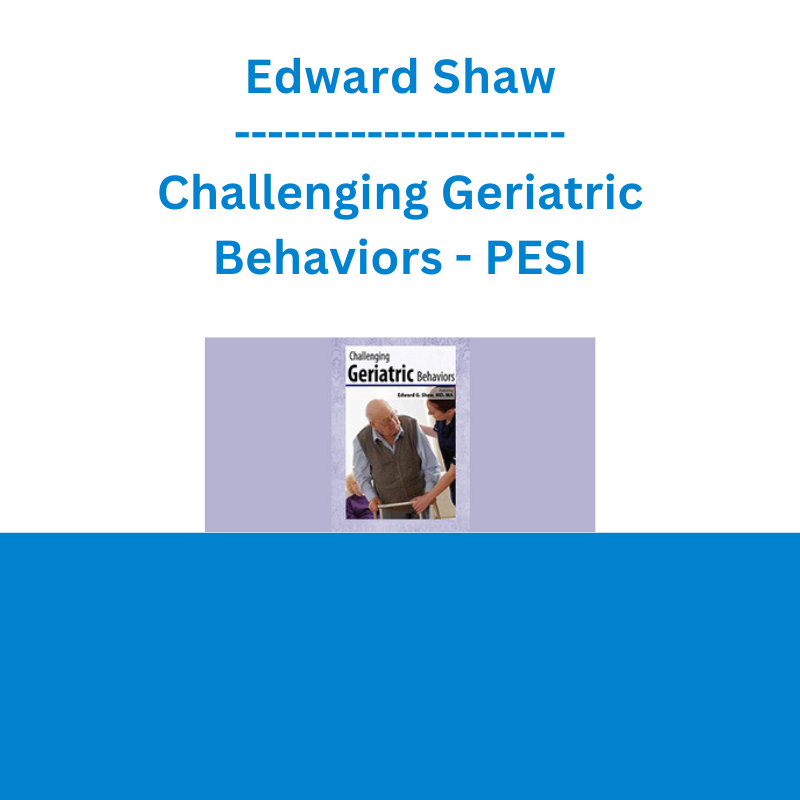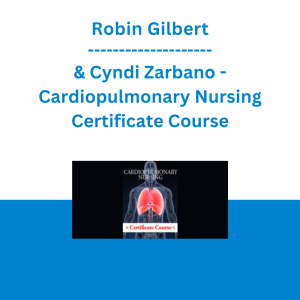*** Proof of Product ***
Exploring the Essential Features of “Edward Shaw – Challenging Geriatric Behaviors – PESI”
Challenging Geriatric Behaviors
Speaker: Edward G. Shaw, MD, MA
Duration: 5 Hours 42 Minutes
Format: Audio and Video
Description
This is the best recording on challenging geriatric behaviors that you will ever complete – GUARANTEED! Join Edward G. Shaw, MD, MA, speaker on geriatrics for a high-energy, dynamic program filled with interesting case studies, insightful discussions and interactive learning. You will finish this recording with practical techniques that you can apply the next day!
Dealing with cognitively-impaired geriatric patients can be challenging even for the experienced healthcare professional. You will learn strategies to manage behaviors such as:
- Dementia
- Aggression
- Anxiety and depression
- Refusal of food and fluids
- Inappropriate sexual advances
If older adults are routinely under your care, minimize your risk of escalating the problems associated with troublesome, often irrational behavior by attending this program. Gain valuable insights into the causes of challenging geriatric behaviors and learn innovative and practical intervention strategies to improve the care you provide.
Speaker
Edward G. Shaw, MD, MA
Empath Education, LLC
Edward G. Shaw, MD, MA is dually trained as a physician and mental health counselor. He was the primary care partner for his late wife, Rebecca, who was diagnosed with early-onset Alzheimer’s disease in 2007 at age 53 and died in 2016 after a 9-year journey. Ed was a practicing academic radiation oncologist for 23 years, specializing in the treatment of adults and children with brain cancer. In 2010, inspired by Rebecca’s journey, his medical interest shifted to dementia diagnosis and treatment, and with his addition training in mental health counseling, he founded the Memory Counseling Program in 2011, part of the Section on Gerontology and Geriatric Medicine and the Sticht Center on Healthy Aging and Alzheimer’s Prevention at Atrium Health Wake Forest Baptist in Winston-Salem, North Carolina. The program serves individuals, couples, and families affected by Alzheimer’s disease or another type of dementia.
He is the author of four books. Along with coauthors Deborah Barr and Dr. Gary Chapman, he wrote Keeping Love Alive as Memories Fade: The 5 Love Languages and the Alzheimer’s Journey, which describes his moving personal story of care for Rebecca coupled with an innovative use of the 5 love languages in dementia counseling. He also wrote The Dementia Care Partner’s Workbook, a support group manual and self-study guide for dementia care partners, providing understanding, education, and hope for the long journey of dementia caregiving from diagnosis through end-of-life. He has also co-authored two resources for support group leaders, A Leader’s Manual for Dementia Care Partner Support Groups and A Support Group for People Living with Dementia: The Leaders Manual.
Speaker Disclosures:
Financial: Edward Shaw receives a speaking honorarium and recording royalties from PESI, Inc. He has no relevant financial relationships with ineligible organizations.
Non-financial: Edward Shaw has no relevant non-financial relationships.
Objectives
- Develop strategies to manage difficult behaviors in seniors who have an altered perception of reality.
- Manage the signs and symptoms of Alzheimer’s Disease and other dementias.
- Appraise current research on the prevention of Alzheimer’s disease, as well as lifestyle factors to slow the disease progression.
- Determine the safety issues associated with geriatric patients who drive, to be able to identify individuals who pose a safety threat.
- Develop strategies to minimize or redirect wandering behavior in individuals with cognitive impairment.
- Analyze environmental and behavioral causes of agitation.
- Differentiate between appropriate and inappropriate sexual behaviors in individuals with dementia.
- Distinguish between normal sleeping patterns and bedtime issues which could lead to increased health problems.
- Analyze the physical and psychological changes that affect an elder’s desire and ability to eat including the changes in nutritional requirements.
- Determine the signs of caregiver stress and develop intervention strategies to prevent burnout.
Outline
Normal Aging, Dementia, Depression or Delirium
- Normal aging changes of the mind
- Depression, dementia, and delirium
- Alzheimer’s disease and other dementias
- Diagnose, differentiate, and develop a plan of care
Alzheimer’s Disease
- Stages
- Assessment
- Getting a diagnosis
- Behavioral issues of early diagnosis
- Management and interventions
- Pharmacological treatments /li>
Driving with Dementia
- Driving safety
- Legal issues
- Assess driving abilities
- How to take the keys away
Wandering
- Reasons why cognitively impaired individuals wander
- Is wandering a bad thing?
- Issues to consider
- Manage a wanderer’s behavior
Physical Aggression
- Identify the cause of aggression
- Loss of impulse control
- Regression of the mind/child-like mind
- Manage the problem
Inappropriate Sexual Behaviors
- Normal sexual drive or inappropriate behavior
- Cognitively impaired individuals
- Medication management
- Ethical considerations
Refusing to Eat/Forgetting to Eat
- Reasons why geriatric patients slow or stop eating
- Nutritional needs in a geriatric patient
- Improve nutritional status
- Malnutrition and dehydration
- Alternatives to eating
Sleepless Nights
- Sundowning and behavioral problems in the evening
- Why does sundowning occur?
- Environmental interventions to decrease aggressive behaviors
- Medication management when it becomes problematic
Caregiver Stress
- Physical, psychological, and emotional stress
- Identify caregiver burnout and ways to help
- Assist the caregiver
Other Issues
- Ways to identify potential falls and prevent injury
- Causes for orthostatic hypotension
- Ways to avoid using restraints
Case Studies: Learning from Experience and Mistakes
- How to manage sundowners
- Strategies to improve hygiene
- Reassurance and redirection
Target Audience
- Nurses
- Physical Therapists
- Physical Therapist Assistants
- Occupational Therapists
- Occupational Therapy Assistants
- Speech-Language Pathologists
- Social Workers
- Home Healthcare Providers
- Nursing Home Administrators
- Registered Dietitians & Dietetic Technicians
- Recreation Therapists
Reviews
Sharon D
“Great presentation! I’ve been to many PESI workshops and this was one of the best. I am a psychologist working in long-term care facilities, and would LOVE to see this information in a training for facility staff. They are quick to ask for medications to solve problems they are actually creating with an approach that doesn’t work. Education about these issues is a gigantic need!”
Kelly B
“This was one of the best seminars I’ve attended related to behaviors and dementia”
Susan Anzivino S
“One of the best PESI workshops I’ve participated in.”
Please see the full list of alternative group-buy courses available here: https://lunacourse.com/shop/










 Robin Gilbert & Cyndi Zarbano - Cardiopulmonary Nursing Certificate Course
Robin Gilbert & Cyndi Zarbano - Cardiopulmonary Nursing Certificate Course  Simpler Trading - Bruce Marshall - The Options Defense Course
Simpler Trading - Bruce Marshall - The Options Defense Course